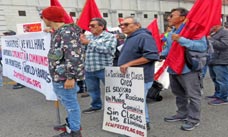Communism: The Answer for Anti-Capitalist Masses Worldwide
CALIFORNIA (USA)— “We know that capitalism is creating disasters for the masses,” said comrade A at our pre-May Day dinner. “Comrade B discussed the climate crisis. We could also discuss the migration crisis, the economic crisis, intensifying racism and sexism, growing wars and more. I think we would all prefer to live in a communist world without borders or money. We all donate time and resources to help individuals and causes. We may not be so sure how we can mobilize masses for that.
“Look how we organized this dinner,” she continued. “Everybody helped to plan, everybody contributed, everybody shared. We only needed money to get stuff from the market. In communism, when we need to get supplies from wherever they are stored, the workers there won’t ask for money. They will show us what fresh, locally sourced, minimally processed foods are available. And maybe suggest ways to prepare them.”
C jumped in. “My family in Utah is very conservative, but in their small town everybody helps, and everybody shares,” she said. “Maybe if we called it ‘community’ instead of ‘communism’ they would support it.”
Others questioned this. “We would get attacked more sharply for trying to hide that we’re communists,” one answered. “Your family are good people, but probably not the ones who will lead the revolution. That’s why we say industrial workers and soldiers, especially the most exploited, are key to mobilizing masses.”
But everyone agreed with D that we must do better at explaining how communism will work and why we think it’s possible.
J brought up CECOSESOLA, a non-hierarchical solidarity association of cooperatives in Venezuela founded in 1967. They provide food, health care, and more at below-market cost to 55,000 people. Coop workers get paid double the government-set minimum wage, and the amounts are based on needs – more for those with children.
We agreed that this money-based system is not communism. “But it shows how people can cooperate without bosses,” J emphasized.
F had visited the rural, mainly indigenous Zapatista-controlled area in Chiapas, Mexico. Originally Zapatistas waged armed struggle against the Mexican capitalists, hoping to spark a revolution against neoliberalism. Meanwhile, however, they raised reform demands.
“They gave up armed struggle because they knew they’d be wiped out,” F said.
“That’s a problem with their nationalist ideology,” A commented. “It can’t mobilize the whole working class – including soldiers – the way communist working-class internationalism can.”
“That’s true,” F agreed. What impressed her was their collectivity in work and, even more, their broad political education. “I was able to attend a mass meeting where they discussed world events, first in the Indigenous language and then in Spanish,” she said.
Both examples show that masses of people are already struggling to create alternatives to capitalism. M concluded by inviting everyone to march with ICWP on May Day to help spread our ideas about why that alternative must be communism and nothing less. Everyone said they planned to come.
In the end, only the ICWP members marched; others couldn’t get off work or had last-minute family obligations. But everyone took extra copies of Red Flag, and we all look forward to our next dinner event.


